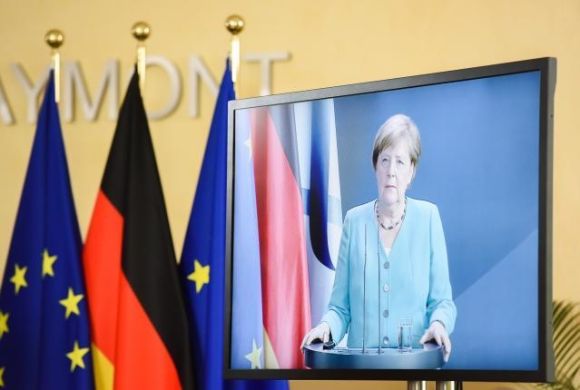
Members of the European Committee of Regions (CoR) emphasised the importance of a cohesive and inclusive response to the coronavirus crisis to German Chancellor Angela Merkel at the committee’s plenary session during European Regions and Cities week.
Other issues raised by assembled members touched on climate change, Brexit, the migrant crisis and the 2021-2027 long-term EU budget.
Chancellor Merkel was speaking at the event to outline the priorities of Germany’s presidency of the Council of the European Union.
Addressing Chancellor Merkel after her address at the plenary session, Olgierd Geblewicz, a member of the European People’s Party (EPP), said that “the future of Europe is about the stable recovery from the COVID crisis.”
"We need to fight the COVID together in the spirit of solidarity and close partnership between European, national, regional and local authorities.”
Geblewicz outlined the importance of regional participation in the EU’s coronavirus recovery plan: “As CoR members, we experience everyday, the real impact of COVID on the ground.”
"To win, we cannot give up on cohesion as a European value. The cohesion is the foundation on which we have built the European community, and there is no doubt that it has improved prosperity in all European regions.”
"What is really needed is coherent resilience, including all European cities, regions and villages.”
Kieran McCarthy, president of the European Alliance group (EA), echoed Geblewicz’s calls for all-inclusive resilience to the virus.
“The 95,000 local and regional authorities are part of team Europe, and we need to be at the heart of delivery your priorities, and in particular, dealing with the response and recovery to combat COVID-19.”
McCarthy, an independent councillor based in Cork, Ireland, also touched on challenges still posed by the United Kingdom’s withdrawal from the European Union.
“As you [Chancellor Merkel] face into another European summit this week, I need to mention the EU trade discussions and the impact a no deal will actually have on regions across the EU.”
“We were very worried from an Irish perspective as this would take us back decades in relation to the progress achieved on the island of Ireland."
"We hope that there's going to be a deal there that's acceptable to both sides, but time is of the essence."
In her response to McCarthy's concerns, Chancellor Merkel ensured that Ireland “will not be left alone” in the trade negotiations.
Climate change is also a pressing issue for the CoR. Speaking from Finland, Satu Haepanen advocated for a greener Europe.
"Usually, at this times of year, we wait for the first snow to fall.”
“But now I look astonished at my little garden, my flowers are still blooming, my sunflowers flourishing. This all is so exceptional. Even the migratory birds have not left yet.”
“This is what I call climate change”, she said.
"The economy of Europe has to be transformed to look at the one and sole direction: stopping climate change.”
Merkel confirmed that she was committed to delivering a more eco-conscious European Union, and stated that the German presidency supports “the sustainable development of cities, and we recognise the importance that that has for the cohesion of Europe.”
Christophe Rouillon, a member of the Party of European Socialists (PES), commended Chancellor Merkel's handling of the migrant crisis in Europe and the planned recovery to the COVID-19 pandemic. €150bn has been put aside to protect the EU from the socio-economic impacts of the virus.
Despite this, Rouillon maintained that there is more to do: "Europe is like a bicycle: if you don't keep moving forward, you will fall".
“Mrs Merkel, you can do a lot more for Europe and we count on you and you can count on us.”
Francois Decoster, of the Renew Europe group, identified the on-going migrant crisis as an area in EU policy that could be improved upon.
“We have great hopes in the German presidency to reach a solid political agreement, and to really make sure that we can change direction, and we can move from words of solidarity to acts of solidarity.”
Merkel said that the crisis was “one of the most difficult issues”, and that it is “not something that the presidency alone can solve”.
“We will absolutely do our very best. We will make an effort in pushing this discussion forward”, she added.
by Fiachra Gallagher (Ireland)
On the same topic: Merkel’s Address to CoR: "Together" towards the recovery of Europe, a turn green political line



